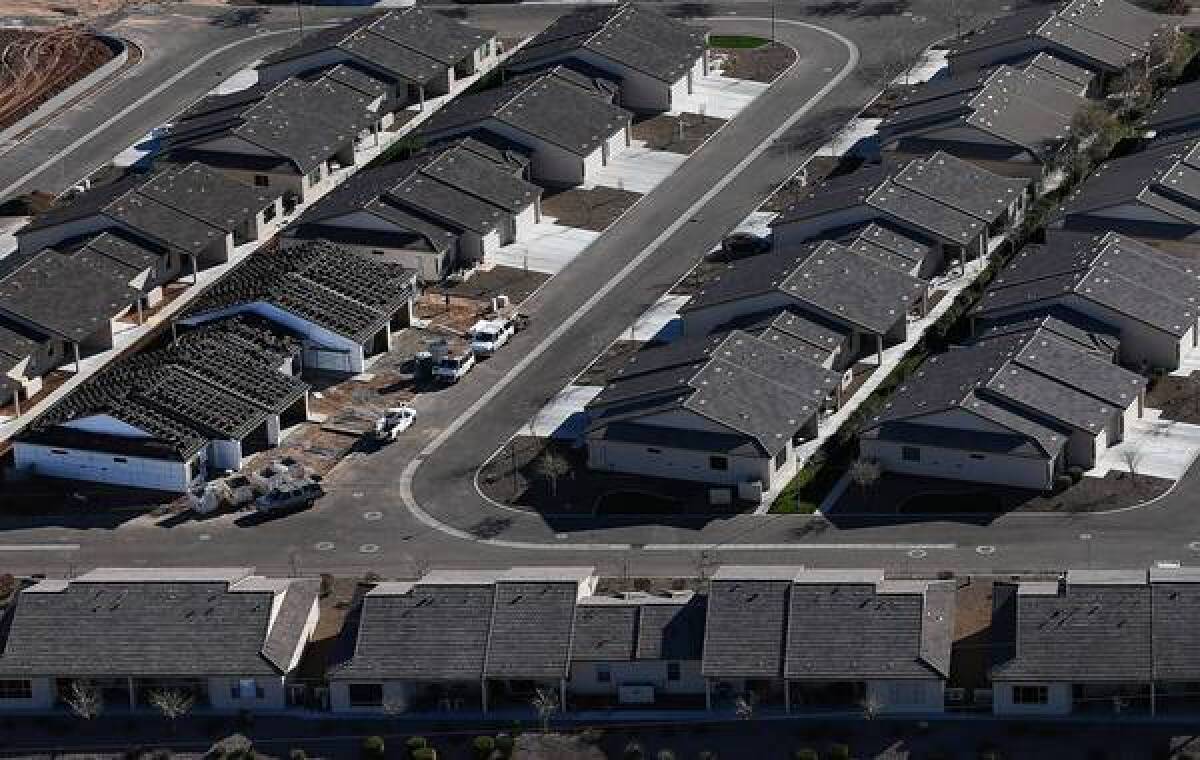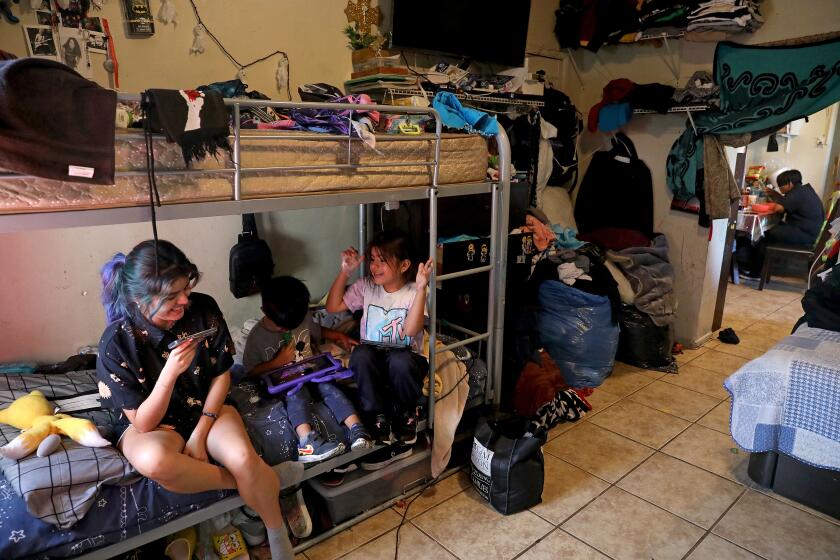Homeownership remains a goal that should be encouraged

I have a confession to make: I am a homeowner.
That’s a dangerous thing to say. We homeowners are getting blamed for a lot of today’s economic ills, and labeled dupes besides.
It’s said that we profiteer from an undeserved tax break. That our obsession with ownership drove the nation to make unwise policy choices during the last eight decades. That our 30-year fixed-rate mortgages are dinosaurs dependent on government subsidies.
We’re told that by treating our homes as piggy banks, we impoverished ourselves and our children. That we would almost certainly be better off renting rather than owning. That we would be richer had we sunk our nest eggs into stocks and bonds.
But it’s time to stand up for homeownership. Because if we convince ourselves that just because home values declined after 2007 the U.S. should stop encouraging ownership, we’ll be making a drastic mistake.
The fact is that there are sound reasons for homeownership — though it’s not for everyone — and very sound reasons for government policy to encourage it.
Much of today’s attack on the principle of homeownership doesn’t address that principle at all. It deals instead with the housing crash, and purports to find that the crash was the result of excessive encouragement of homeownership, especially among low-income families.
The culprit, according to this argument, is the Community Reinvestment Act, a President Carter-era initiative that targeted banks’ discrimination against home buyers in low- and moderate-income neighborhoods. The claim is that the CRA induced banks to lower their lending standards to meet CRA lending goals in disadvantaged neighborhoods, setting the nation up for the subprime crash.
This notion has been thoroughly debunked. As early as 2008 it was systematically demolished by Federal Reserve Gov. Randall Kroszner. In 2011 it was so discredited that even the Republican minority of the Financial Crisis Inquiry Commission disavowed it as a cause of the crash.
Make no mistake: Blaming the CRA for the housing crash borders on racism — it’s a way of blaming minority borrowers for a disaster that was wholly the responsibility of Wall Street bankers.
In fact, mortgage banking firms such as Countrywide, not banks subject to the CRA, took the lead in pushing low-quality mortgages on any applicant who could hold a pen. And it was those risky products — bristling with hidden fees, prepayment penalties, exposure to variable interest rates — not risky borrowers, that produced the crisis. Study after study has found that qualified borrowers in conventional fixed-rate mortgages perform equally well across the income spectrum.
Recently, another attack on the principle of homeownership has moved to the forefront. The claim, put forth chiefly by Andrew J. Oswald of the University of Warwick in England and David G. Blanchflower of Dartmouth College, is that a high level of homeownership is associated with a high level of unemployment in a state or community. Their reasoning is that chiefly by hampering workers’ ability to move to find work, homeownership suppresses economic growth.
Yet, as they acknowledged, there’s no evidence that homeowners themselves are disproportionately unemployed, or that the inability to sell a home (this is known as “house-lock”) affects anyone’s ability to find a job. In their latest paper on the topic, published this spring, they conceded that the relationship between homeownership and unemployment “remains poorly understood.”
It might be more accurate to say it’s unproven. “All sorts of things keep people from being mobile,” says Richard K. Green, director of the Lusk Center for Real Estate at USC, who has debated Oswald on the topic. He observes that age and marital status are highly correlated with homeownership, but also are factors that can keep families from being mobile even if they’re renting.
The attack on homeownership is closely linked to an attack on the 30-year fixed-rate mortgage. You’ll hear it dismissed as an curiosity that wouldn’t exist at all if not for massive government support via government guarantees via Freddie Mac and Fannie Mae. That supposedly makes it a relic, ripe for replacement by the private sector, which of course has only your best interests in mind.
But that’s incorrect. The pre-payable 30-year fixed mortgage remains the pillar of the American housing market, and for good reason.
As David Min of UC Irvine has pointed out, the 30-year fixed loan inoculates homeowners from interest rate risk and places it where it belongs: on financial institutions that can plan for interest rate changes and hedge against them. In the recent crash, short-term adjustable-rate loans cratered because their borrowers couldn’t manage the sudden jump in rates; the 30-year mortgage kept millions of people in their homes because they could afford to sit tight.
There’s no real doubt that homeownership is a goal that should be encouraged by government policy. Homeowners vote more often than renters. They engage more with neighborhood and community groups. Studies suggest that their children do better in school and are more likely to graduate from high school and move on to postsecondary education.
The difference in the length of homeownership is the single largest factor underlying the wealth gap between black and white families, according to research by Thomas Shapiro of Brandeis University. That’s important because from 1984 to 2009 the gap in median net worth tripled, from $85,000 to $236,000. Much of the difference is home equity, which gives home-owning families a leg up in helping relatives with down payments, lowering the cost of borrowing and improving access to credit, Shapiro has found.
It’s true that some of these advantages were sapped by the housing crash. But many long-term homeowners were still able to weather the storm better than renters.
It’s also true that renting is a good choice for many Americans, including young people who may need to move often at the outset of their careers. And it’s proper to question whether the mortgage interest tax credit is the best tool for promoting homeownership. Green, for one, advocates replacing it with a refundable tax credit, which could be phased out for wealthier homeowners and wouldn’t encourage people to buy bigger homes than they need just to capture the tax break.
But the worst thing that could happen as a result of the debate over housing is that government policy could reverse. Already credit is tighter for low- and moderate-income Americans than it should be. Removing the government-sponsored housing lenders, Fannie Mae and Freddie Mac, from the market, as many conservatives advocate, would close the housing market to those borrowers even tighter.
That’s the wrong option. “People still want to be homeowners,” Green observes. Why would we want to stifle an aspiration so beneficial to society and the economy?
Michael Hiltzik’s column appears Sundays and Wednesdays. Reach him at mhiltzik@latimes.com, read past columns at latimes.com/hiltzik, check out facebook.com/hiltzik and follow @hiltzikm on Twitter.




